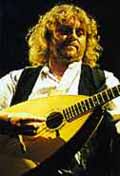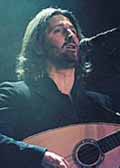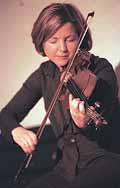 |
||
The Living Tradition
|
|
|||
|
Dougie MacLean's Real Music Bar
|
|
|||
|
{graphic} |
||||
|
THE old hotel gazes benignly over the slumbering Tay, and equally benignly over the gaggle of musicians in the garden by the river's bank. Someone's trying a whistle; there are fiddles, a bodhrán, two mandolins, and a box. Amongst the players is a guitarist with a familiar face and very familiar long hair framing it. It's Dougie MacLean out there in the sun, whooping it up, as the tourists look on entranced. For this is his patch... literally: he's in front of his hotel, the Taybank, with it's now established ‘MacLean's Real Music Bar' on the ground floor. We're in Dunkeld - which, with his administrative centre and recording facilities at his home at nearby Butterstone, his and artist wife Jenny's shop in Cathedral Street, and the hotel, means that this is definitely MacLean country. A weel-kent face on the Scottish scene since Tannahill Weavers days and on the international stage also (this year will see him in Alaska and Tokyo, to name but two places), his acquiring of the hotel has been a partial realising of dreams. Not that buying it was exactly planned. "No", he says, "we just noticed it up for sale one day, looked at each other and said, "Let's do it!" So we did. Because of all the things that can be done with it, it completes the circle for us together with the shop and Butterstone." The project's origins go back a long way, he explains. "I've played fiddle in this village's pubs since I was a kid, along with the old-timers. It was normal then to play an instrument or sing. Pubs were places you visited to enjoy musical conversations as well as spoken ones. But over time, that died, along with the fiddling and the songs. It hit me a few years ago when I went to a bar, when off touring, and returned feeling worse than before. "Something wrong there", I thought". "I want back to those days, when pubs belonged to people. Here, there'll be no TV, no Bandit and people can make music just when they want to. It's not mere nostalgia: people communicating and making music is actually a challenge to the way things are. We're talking about ownership of a culture, about human creativity. I don't even care if people are bad musicians if they're enjoying it and they're giving. If they're good, great - that pleases others, perhaps encourages them. I want minimum rules and I won't vet the type of music either. Traditional, Country, Jazz, all fine by me". Buying the hotel was two years ago. A tour around the place gives an insight into his aspirations about music now, and about life generally. The first floor has the ‘Music Gallery'. Decorated with Jenny's pictures, the handsome room is oak-floored, with bay windows overlooking the river. Once the manager's office (the Taybank began as a bank), a sturdy steel rod goes through the floor to open or close the vault downstairs. The vault's armoured door lies behind the modern bar. The Gallery is used for the folk club and has a permanently set-up acoustic PA. It's also used for evening classes on whistle, guitar, art, performance skills and so on. There are Masterclasses, too, both real and virtual. Upstairs, bedrooms for paying guests aside, there's an ‘Internet Lounge' as well. It features a non-alcoholic bar for use by youngsters, and hi-tech things hum and chatter, and flash green lights at anybody who's interested. The 200 year-old structure seems to take all this in its stride - although what the stolid Perthshire farmers of yesteryear would have made of their bank being invaded by strange machines and littered with folkies is anybody's guess... The entrance lobby is a cafe bar nowadays. That cafe bar is another clue to Dougie's vision. "Ok," he says, "we're mainly about music here, obviously; but you can't really separate music from all the other things that make human beings what they are. Thinking, ideas, are the key, ideas of all kinds. So, I wanted this space to be where people could argue about whatever they liked, theatre, politics, art, environment, nationhood, anything. They do argue, too; you get some really good-going debates there, just as I'd hoped". During a 25-year career, a professional musician makes a lot of friends and contacts. Dougie has certainly done that. From early Ewan Sutherland days (Ewan remains a close friend) through Silly Wizard and beyond, he's encountered a positive galaxy of fine performers: Kathy Mattea, Dolores Keane, Billy Jackson, Ry Cooder, Putamayo, Maggie Mcinnes, Andy Thorburn, Mary Black, the list is long. In a chummy way, some of them drop by the Bar from time to time. "It's nice", he says. "We'd wanted the hotel to be a meeting point. Dunkeld being roughly mid-Scotland, it's en route for bands heading north, or coming south, and we thought they might come in for a bit of rest and recuperation after touring, say; or have a wee tune, or whatever. There'd maybe be a sharing of musical ideas, too, you know, Gaels talking to Glaswegians and so on". "It's working", chips in Jenny. "We've had Jock Tamson's Bairns, for instance, guys from Wolfstone, Iron Horse, Sheena Wellington... One afternoon we were working upstairs and we heard some incredible guitar and piano coming from the bar. It was Bill, Muddy Waters' son, a really lovely guy, who was returning from an Inverness gig with his band. What a session that turned out to be!" Inevitably, launching the Taybank has taken up a huge amount of everybody's time. "The last two years have been the craziest of our life", says Dougie. The project is a big responsibility. Seven full-time staff are involved and around a dozen part-timers. Almost all are from within a ten-mile radius of the town. "Local jobs have been created" Jenny comments. "More than that, I think it's given a bit of a boost to Dunkeld generally, I know of six people who've moved here partly because of it". Work on the building has had an impact on Dougie, certainly. It hasn't exactly... er ... dramatically slowed him down, but it has slightly reduced some of his external commitments, temporarily. ‘Reduced', but not by a lot. The ‘reduction' is somewhat relative. He's got an internet programme now on stream, using bits from the bar sessions and from the folk club (he takes part in both when he can). For a while, too, work has been going ahead on broadcasting in the States. The ISDN lines will be ready once a last item of equipment is in operation. Come September, Dunkeld will be on air on several Californian radio stations and one in Alaska. There's also to be a show called "Music Deli" with ABC in Australia. "This technology is amazing", he exclaims excitedly, "with it you can spin Scottish music around the world, and we will". He's found time for recording, naturally. There's been a live CD, available on the internet and by mail order, called "Dougie MacLean - Live: From Two Ends Of This Earth". Yet the rather exhausting title means what it says. The album is an amalgam two different performances, one in Glasgow's Royal Concert Hall and the other recorded live, at the Port Fairy Folk Festival, in Australia. "Perthshire Amber" is the other CD. This has been something of a new departure, not least because it's a CDROM. Written by Dougie, it was arranged by Kevin McCrae from the Scottish Chamber Orchestra. Its four movements fuse classical music with the music of the Celtic countries. It also features what might be termed ‘the Dougie MacLean Band'; that is, Graham Mulholland (pipes/whistle), John Morran (guitar), Jamie MacLean (percussion) and Pete Clarke (fiddle) as well as the 11-strong BT Scottish Ensemble. It's being toured in Singapore, England, New Zealand, Australia, West Coast United States and Alaska. Understandably, Dougie is distinctly upbeat about the whole concept. Working at this pace can be a strain, though. People often think (rightly) that professional musicians' lives are not their own. It's the price of celebrity, of course, clicking cameras, crowds, fans always wanting one more song. Generally, however, this is limited to the public arena, on concert platforms, in airport lounges, at CD launches. Home at least, it might be imagined, would always be a place apart, a haven. Well, it's not always so for Dougie. Last year, Butterstone was used for the joint BBC Alba and Raidió Teilefís Éireann series "Sruth na Maoile". This featured him and various big-hitters from Gaelic song like Arthur Cormack, Tomás MacEoin and Máire Breatnach from Ireland. "Home was turned into a film set", recalls Jenny. "So many people seemed to be there, we even met the Irish Ambassador. Mind you, we're used to it, there's always folk coming and going". Fortunately, the couple have a final retreat in an emergency, their old farmhouse at Riof on Lewis. Dougie sees it as his songwriting home. It's always there when peace and inspiration are needed, and where he can indulge his love of boating and Jenny her passion for horseriding. Although his family was originally from Mull, the Outer Hebrides beckon him. This August he's filming there, travelling between Barra, North Uist, Benbecula and Lewis. "The idea - BBC Alba are doing it - is to sail around the four islands, landing on each for a series of ‘musical conversations'. They'll cover songs, tunes, stories, culture, aspects of lives and landscapes. Riof will be the location for the last one. The Beeb will have a couple of rigid Greenpeace-type inflatables. Our boat's rather tougher, and I hope the sea is kind to them!" Dougie is a man of contrasts. He's rooted in history with strong attachments to tradition. His songs express this, with their constant emphasis on people's relationships to each other. The Music Bar is a physical embodiment of the same concern. Yet, for all the historical focus, he's utterly wedded to the 21st century. He's mightily taken by new technology of all sorts. On the commercial side of Dunkeld Music.Art.Media (the collective title for his various enterprises) for example, web marketing has this year apparently overtaken the traditional bricks-and-mortar operation. He calls new technology ‘genuinely empowering': "It gives musicians far more control, so their output isn't forever leaching away into the hands of others. That's good news for Scotland... or for Ireland... or for East Anglia, if it comes to that. With this gear, you're no longer a folk musician with his arse hanging out of his trousers, beholden to some wee businessman. This can be your show now". Nice notion, that; musicians having their own show... Dougie's certainly achieved it for himself and wants to see others achieving it too. He claims to have no personal ambition, but it's difficult to believe that that might mean him taking life easier. He still has plans and says he has much more to do. A further CD is being mooted and there'll, seemingly, be developments at the Taybank. "Truthfully", he says, "if asked what more could be done with this place, I'd say ‘anything'. You see, you're only limited by your own imagination". Steve McGrail |
||||
|
Links, further information and recordings: |



